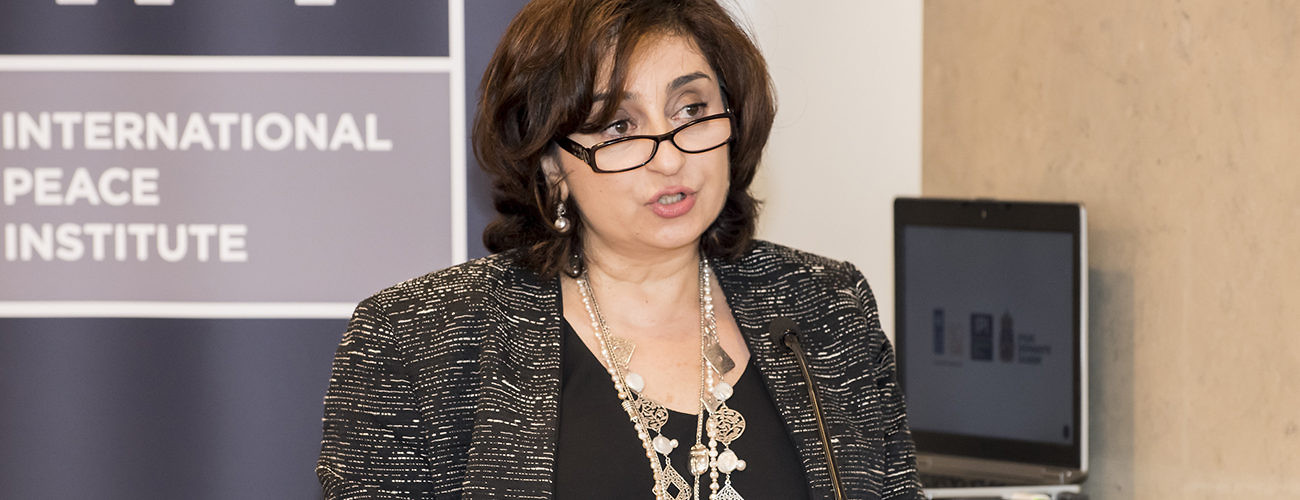Establishing rule of law is as much a political project as a technical one, experts agreed at an IPI policy forum on June 30, 2016. Through national case studies, experts explored ways and means of combining political engagement with technical expertise to establish effective and rights-based rule of law.
Sima Sami Bahous, Assistant Secretary-General, United Nations Development Programme (UNDP), said that the importance of politics for achieving peaceful and sustainable development is reflected in the 2030 Agenda for Sustainable Development, and, in particular, Sustainable Development Goal (SDG) 16. Goal 16 calls on member states to “promote peaceful and inclusive societies for sustainable development, provide access to justice for all, and build effective, accountable, and inclusive institutions at all levels.”
Ms. Bahous, also Assistant Administrator, and Director of the Regional Bureau for Arab States, UNDP, argued that political leadership is needed to strengthen the rule of law and achieve the SDGs.
“Strengthening the rule of law is inherently a political process, as it deals with the very foundations of power in societies, especially in those that are emerging from crisis and facing major questions of legitimacy and accountability,” she said.
Ms. Bahous said redefining the rules of the game challenges existing power structures, and warned that those who aim for the laudable goal of establishing rule of law in post-conflict settings will come up against deeply entrenched political obstacles. “The support that we provide must go beyond basic technical assistance,” she concluded.
Tayé-Brook Zerihoun, Assistant Secretary-General for Political Affairs, United Nations Department of Political Affairs (DPA), reminded the participants of the societal consequences when rule of law is not in place. “When human rights abuses are committed with impunity, it breeds discontent and worse,” he said. He highlighted the kind of support his department can provide in the field, from mobile courts to the deployment of police outside of metropolitan areas, as a first line of defense while national rule of law is built up.
Richard Sannerholm, Head of Rule of Law, Folke Bernadotte Academy, made four recommendations to the UN multilateral system to fortify the rule of law by developing transparent legal and administrative institutions to ensure equal access to justice for all citizens. They included making data-driven decisions based on statistical analysis; ensuring field officers are more specific about the risks faced; and building up local competencies.
Dr. Sannerholm’s final recommendation was that, “the UN must improve linkages between conflict prevention and rule of law programming.” He cited UNDP’s and DPA’s joint work as having the potential to effect this.
Sara Hossain, Honorary Director of the Bangladesh Legal Aid and Service Trust spoke about community involvement in countries emerging from military rule. She emphasized that strategic litigation and capacity building are key for such societies, speaking from her experience in Bangladesh. To that end, she explained, while lawyers are critical, they can’t actually do outreach work themselves, so it is essential that they “work with communities, not only around rights, but to impart knowledge around services and where they are available.”
Rachel Kleinfeld, Senior Associate, Democracy and Rule of Law Program, Carnegie Endowment for International Peace, elaborated on why it takes 20-50 years to really change a society on rule of law. Such change occurs in increments, not at an exponential rate, she explained. “The opposition is pushing back at every stage—that’s the nature of politics—opposition organizes against reform,” she said.
She said it is not enough for a post-conflict society to have the technical aspects of rule of law in place, as impunity for that society’s most privileged groups will likely continue. She illustrated this point with the example of the United States. A quarter century after the end of the Civil War, and the abolishment of slavery, there was a court system in place, but it did not prosecute those who committed violence against African Americans, she said. “There was a lynching every three days in South,” she said. This was “not a technical problem, due to a lack of equipment, but a deeply political problem.”
Rule of law programmers, she lamented, are incentivized to show change in nine-month increments, but they face much longer-term challenges. It is “hard to bring catalytic change,” in programs structured in months not years, and thus she called for a reconceptualization. “The question is not, ‘How can I build rule of law?’ but ‘How can my nine-month intervention leverage 20-50 year change?’”
This necessitates a shift from thinking about things like delivering computers and cars during a short period and leaving, to actively partnering with local leadership on the ground, “who will fight for longer than me,” Dr. Kleinfeld said.
The event was co-hosted with the Folke Bernadotte Academy and United Nations Development Programme (UNDP).
Adam Lupel, IPI Vice President, moderated the discussion.








